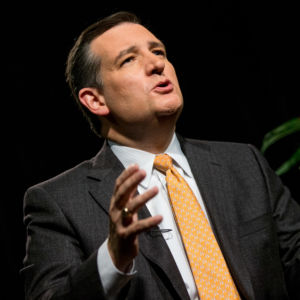WASHINGTON — A top Republican figure has an outspoken plea for getting tough with North Korea just as President Trump goes along with South Korean President Moon Jae-in’s efforts at striking up rapport with North Korea’s Kim Jong-un in an atmosphere of goodwill engendered by the PyeongChang Olympics.
Sen. Ted Cruz of Texas, who battled Trump for the Republican presidential nomination in 2016, called North Korea “the most dangerous place on the face of the planet” in a talk at the conservative Hudson Institute. “It is a really bad idea,” he said, “to have an unstable communist dictator with a significant nuclear arsenal.”
Cruz, a member of the Senate Armed Service Committee’s subcommittee on strategic forces, stopped short, however, of calling for a pre-emptive strike on the North’s nuclear and missile facilities. When I asked him after the talk what he thought of that idea, he acknowledged “the military option” but held back on whether or when to exercise it. Yes, he said, in answer to a follow-up question, the risk would be “significant.”
Cruz, however, was just as tough in his remarks about North Korea as Defense Secretary Jim Mattis, Secretary of State Rex Tillerson and National Security Adviser H.R. McMaster, the members of Trump’s administration with the most influence on North Korean policy.
“When you’ve got Kim Jong-un developing (intercontinental ballistic missiles) that he says are capable of hitting any city in the United States, that’s not acceptable,” he said. It was “important,” he argued, to develop and deploy “the missile capability for defense of the United States.”
The Trump administration, he went on, has “a much more clear-eyed assessment of our adversaries” than did Barack Obama. In keeping with that judgment, he vowed to “continue working with my colleagues for nothing less than complete disbarment of North Korea and securing the peace in Northeast Asia.”
Cruz called for intensifying the pressure on North Korea in two distinct ways —first, by getting recalcitrant foreign powers to honor sanctions fully and, second, by elevating the ability of America’s counter-missile forces to wipe out enemy missiles immediately after they’re launched.
“We have waited too long,” said Cruz, charging that “nefarious regimes have bankrolled North Korea’s nuclear pursuits. He was unequivocal about the need to “target its partners” in order “defend our interests.” Singling out China, Cruz said that “recent reports of Chinese vessels selling oil to North Korea only reinforce my skepticism about China.”
Cruz spoke out at an opportune moment — as the U.S. Treasury Department announced a new set of detailed sanctions against North Korea. These sanctions cover nine companies as well as 16 North Korean individuals and six North Korean ships. Among the companies sanctioned are two Chinese businesses accused of doing business with North Korea in violation of previously adopted U.N. sanctions.
Treasury Secretary Steven Mnuchin issued a harsh warning against North Korea, saying his department would go on targeting “individuals and entities financing the Kim regime and its weapons program.” High on the list of targets were officials — North Korean, Chinese, Russian and others — seen as “complicit in North Korean sanctions evasion schemes.”
Just to make sure the South Koreans understand fully what the United States is doing, Treasury Undersecretary Sigal Mandelker visited Seoul for meetings with senior foreign ministry and financial officials.
The United States imposed the sanctions at a critical time — as South Korea prepares to receive a large contingent of North Korean athletes, officials, cheerleaders and performers for the Winter Olympics. Fearful of upsetting Korean sensitivities, Mandelker, who deals with the effect of financial scams on terrorist activities, backed out of a previous plan to brief South Korean journalists.
Cruz in his Hudson remarks did not mention the latest sanctions but made clear his support for whatever it takes to get Kim Jong-un to talk about doing away with his nuclear and missile program. One way, he suggested, would be to adopt stringent measures against foreign countries dealing with North Korea in violation of sanctions.
How about blocking their exports to the United States? “Access to U.S. markets is a big deal,” he said. He did not mention China in that context, but there was no doubt he had China in mind in view of China’s enormous trade surplus with the United States of nearly $400 billion, by far the largest of any country.
Cruz placed equal emphasis on the need for enhanced defense against enemy missiles carrying weapons of mass destruction.
“Our economy, our military are immensely dependent on space and satellite technology,” he said. “One component of deterrence is military force” since the result of North Korea’s nuclear and missile program “would be a massive strike.”
Cruz was aware, however, the fears in South Korea of escalation of the tensions with North Korea. “The South Koreans are in a difficult position,” he said, acknowledging the danger of “tens of thousands of casualties.”
The standoff, he said, “requires a steel-willed realism and clarity as to what are the objectives” while Kim Jong-un sees nuclear weapons as “essential to unifying Korea” under his own dictatorship.

